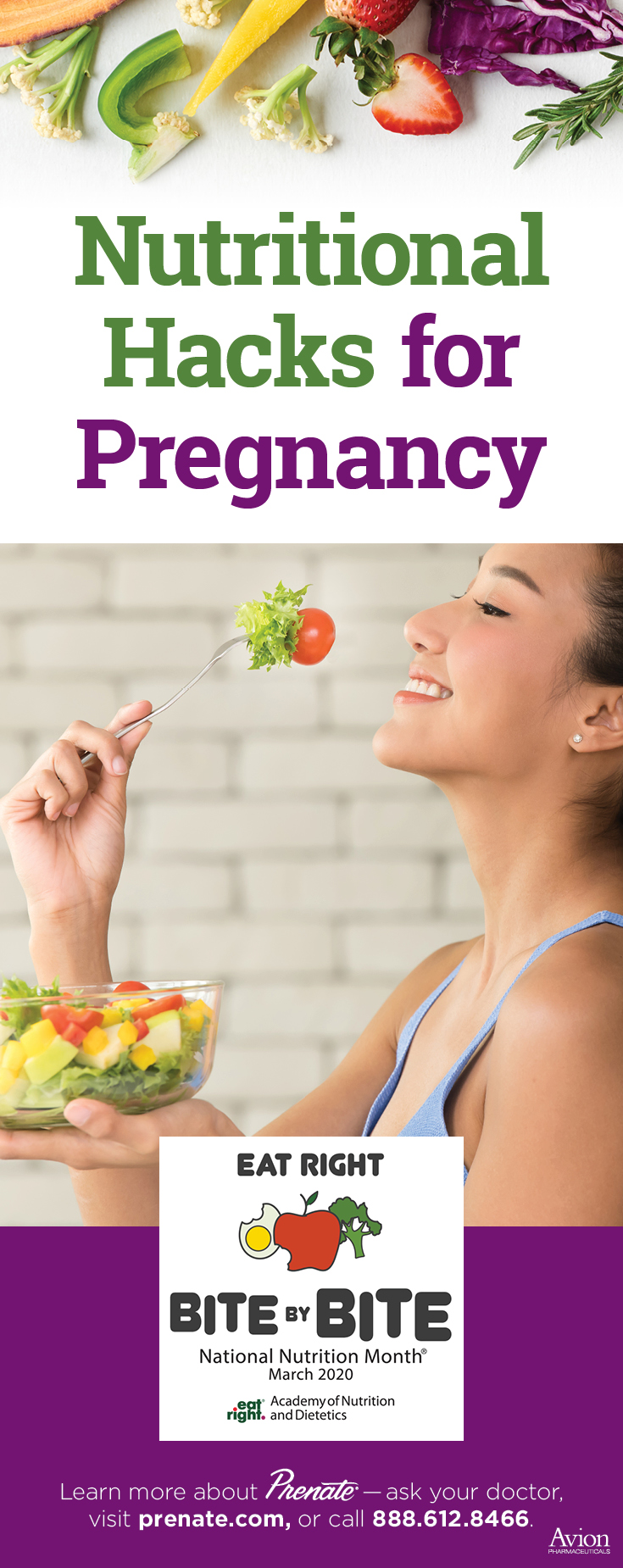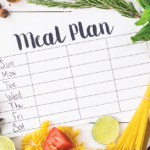Small Nutritional Changes to Make a Big Impact
May 21, 2020
Making healthy choices and getting in great shape don’t require drastic changes to your lifestyle. In fact, some of the most tried-and-true methods for success, particularly when it comes to dieting and weight management, involve setting small, reasonable goals.1 During National Nutrition Month, we’re celebrating all the ways we can improve our health and wellness by paying attention to our bodies’ nutritional needs. Expecting moms should be especially mindful of their nutrition during this time, and since they already have a lot of changes happening in their lives, they may be among those who benefit the most from making small nutritional changes.Eat Right, Bite by Bite
While many diet and nutrition plans seem to mandate big goals and even bigger restrictions, research suggests that setting small, attainable goals leads to higher success rates. This National Nutrition Month, the theme is “Eat Right, Bite by Bite,” which encourages people to be mindful of each meal, snack, beverage or treat they consume. The focus is to get people thinking about small daily nutritional choices that add up over time (choosing to drink water with a meal instead of a soda) instead of setting one big goal (cutting out all carbs.)
With this mindset, every bite is a step in the right direction. Every small change can be celebrated and help maintain healthier nutritional habits in the long run. By contrast, choosing a big goal can be daunting and lead to feelings of shame, regret and disappointment when you make a slip.
Keep in mind that any diet and nutritional changes should always be discussed with your doctor, especially if you are an expecting mother or have recently given birth; however, for most healthy women, making small but meaningful changes to everyday nutrition can improve their personal health and their babies’ health too.
Take a look at the following suggestions for making small nutritional changes that can lead to big health benefits:
H2O is the way to go
Giving up sugar-packed soda, sweet tea or flavored coffee can be a tough nutritional choice. Instead of swearing off these things completely, make a goal to drink water with every meal and to limit sugary drinks to a once-in-a-while treat. Staying hydrated is important, especially when you’re expecting. Pregnant women need to consume more water than the average adult, as water plays an important role in a baby’s development.2
Water is always a better choice than sugary drinks like soda or caffeinated beverages. Sugary drinks can have a mild diuretic effect, which means they can cause you to urinate – and lose water – more frequently. Caffeine has also been linked to an increased risk of preterm labor in pregnant women.3
If you want to get more H2O in your daily routine, it may help to give yourself an incentive. For instance, challenge yourself to see how long you can go drinking only water. Can you last for three days? A week? Give yourself little prizes for each milestone you reach. If you fall off the wagon, don’t beat yourself up. Just try again tomorrow!
Take it slow
Did you know the pace at which you eat can affect weight gain? Studies that compared eating speeds among adults found that people who ate faster were up to 115 percent more likely to be obese than slower eaters.4
Not only do fast eaters tend to gain weight faster, but slow eaters have been found to maintain a healthy weight more easily. This is likely due to the fact that they consume fewer calories, as they allow their brains enough time to receive the signal that they’re full. It can take up to 20 minutes for the brain to get the message that you’re full, so when you’re eating quickly, you may be more likely to consume more calories than you need.5
Opt for baked over fried
Whether you’re preparing veggies, meats or snacks, choose baking or roasting as your cooking method. It’s well known that fried foods contain higher levels of saturated fats; however, don’t assume grilling is a better option. Grilling meat such as beef, pork, poultry or fish can cause the formation of unhealthy compounds that have been linked to heart disease and cancer.6 That’s not to say you can’t enjoy a backyard cookout every once in a while, just be mindful of these potential effects and avoid consuming food in excess that’s grilled or fried.
Grilling, baking, broiling or roasting meats and veggies enhances their natural flavors without promoting the formation of harmful compounds associated with grilling. If your regular diet consists of a lot of fried or grilled foods, consider making a conscious effort to replace your fried food choices with a baked or broiled alternative at least once or twice a week. Once you’ve found you can do it, try upping your goal. Before you know it, these small steps will lead you to enjoying fried or grilled foods only as a rare treat.
Get your ZZZs
Believe it or not, your sleep habits can be linked to nutrition. People who do not get enough sleep tend to have disrupted eating patterns and are more likely to be overweight.7 This is largely because people who do not get adequate sleep (or who sleep for short durations throughout the day) have circadian rhythms that are off balance. Circadian rhythms regulate our bodies’ sleep/wake cycle and are linked to hormones related to hunger. People who don’t sleep well may feel hungry at odd times of the day or night, which can lead to late-night snacking, fast food runs or quick calorie-packed meals that do not provide adequate nutrition.
There are simple changes you can make to improve your chances of getting a solid night’s sleep. For starters, avoid looking at your phone, watching TV or being exposed to other sources of blue light before going to bed. Blue light has been linked to decreases in the secretion of melatonin, the hormone that helps us go to sleep.
If you do feel those snack cravings kick in at night, just remember this month’s mantra: Eat Right, Bite by Bite. Don’t beat yourself up or try to sleep through hunger. Let yourself get a snack, but make sure it’s a healthy choice (fresh fruit, yogurt, whole grain cereal, etc.) and then go back to bed.
Another tip for getting good sleep: Try going to bed earlier, even if you don’t feel tired. Set an alarm for an hour earlier than you’d normally go to bed. Get comfortable, turn off the lights, listen to soothing music or a guided sleep meditation. Keep doing this every night for a week to try to condition your mind and body to associate a certain time with decompression and rest. After a while, you’ll probably start to feel sleepy around that time, and you’ll be on the way to a better night’s rest.
Prenate® Vitamin Family
This post is sponsored by the Prenate® Vitamin Family, a line of prescription prenatal supplements designed to enhance preconception, prenatal, and postpartum nutrition in women. Talk with your doctor about how taking a daily prescription prenatal or postnatal vitamin could help support a healthy pregnancy and postpartum wellness.
You Are About To Leave This Website
By clicking continue, this link will take you to a website to which Alora Pharmaceuticals Policies & Terms of Use do not apply. Alora and its subsidiaries do not control the content or accuracy of third-party websites and assume no responsibility for their use.
















